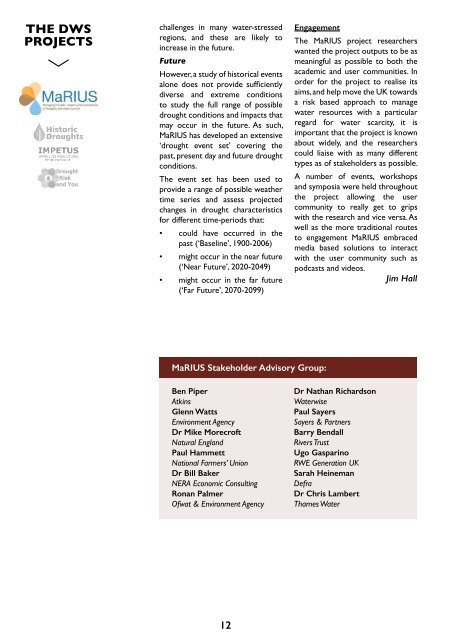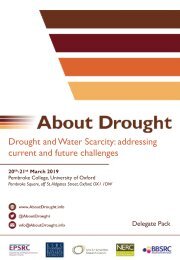About Drought Handbook: Outputs & Impacts
As the UK’s £12m Drought and Water Scarcity (DWS) research programme reaches its conclusion with a final event at The Royal Society in London, this handbook draws together the key outputs and outcomes. The book also features a series of interviews with our leading stakeholders, which highlight how successfully we have met our objectives to produce cutting-edge science that has made a demonstrable impact on how decision-makers manage water scarcity in the UK.
As the UK’s £12m Drought and Water Scarcity (DWS) research programme reaches its conclusion with a final event at The Royal Society in London, this handbook draws together the key outputs and outcomes. The book also features a series of interviews with our leading stakeholders, which highlight how successfully we have met our objectives to produce cutting-edge science that has made a demonstrable impact on how decision-makers manage water scarcity in the UK.
- No tags were found...
Create successful ePaper yourself
Turn your PDF publications into a flip-book with our unique Google optimized e-Paper software.
THE DWS<br />
PROJECTS<br />
challenges in many water-stressed<br />
regions, and these are likely to<br />
increase in the future.<br />
Future<br />
However, a study of historical events<br />
alone does not provide sufficiently<br />
diverse and extreme conditions<br />
to study the full range of possible<br />
drought conditions and impacts that<br />
may occur in the future. As such,<br />
MaRIUS has developed an extensive<br />
‘drought event set’ covering the<br />
past, present day and future drought<br />
conditions.<br />
The event set has been used to<br />
provide a range of possible weather<br />
time series and assess projected<br />
changes in drought characteristics<br />
for different time-periods that:<br />
• could have occurred in the<br />
past (‘Baseline’, 1900-2006)<br />
• might occur in the near future<br />
(‘Near Future’, 2020-2049)<br />
• might occur in the far future<br />
(‘Far Future’, 2070-2099)<br />
Engagement<br />
The MaRIUS project researchers<br />
wanted the project outputs to be as<br />
meaningful as possible to both the<br />
academic and user communities. In<br />
order for the project to realise its<br />
aims, and help move the UK towards<br />
a risk based approach to manage<br />
water resources with a particular<br />
regard for water scarcity, it is<br />
important that the project is known<br />
about widely, and the researchers<br />
could liaise with as many different<br />
types as of stakeholders as possible.<br />
A number of events, workshops<br />
and symposia were held throughout<br />
the project allowing the user<br />
community to really get to grips<br />
with the research and vice versa. As<br />
well as the more traditional routes<br />
to engagement MaRIUS embraced<br />
media based solutions to interact<br />
with the user community such as<br />
podcasts and videos.<br />
Jim Hall<br />
MaRIUS Stakeholder Advisory Group:<br />
Ben Piper<br />
Atkins<br />
Glenn Watts<br />
Environment Agency<br />
Dr Mike Morecroft<br />
Natural England<br />
Paul Hammett<br />
National Farmers’ Union<br />
Dr Bill Baker<br />
NERA Economic Consulting<br />
Ronan Palmer<br />
Ofwat & Environment Agency<br />
Dr Nathan Richardson<br />
Waterwise<br />
Paul Sayers<br />
Sayers & Partners<br />
Barry Bendall<br />
Rivers Trust<br />
Ugo Gasparino<br />
RWE Generation UK<br />
Sarah Heineman<br />
Defra<br />
Dr Chris Lambert<br />
Thames Water<br />
12




